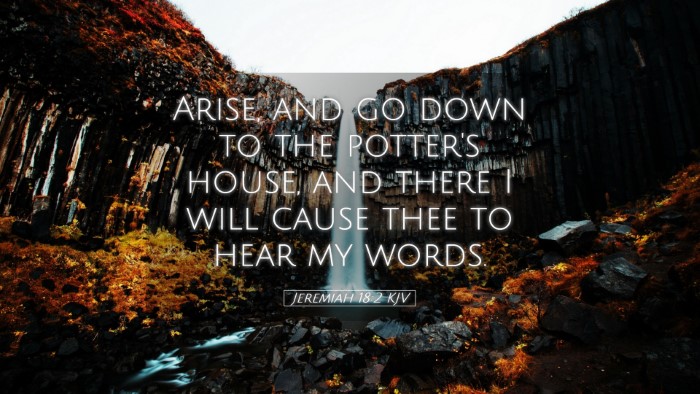Commentary on Jeremiah 18:2
Verse: "Arise, and go down to the potter's house, and there I will cause thee to hear my words."
Introduction
This verse serves as a pivotal point in the prophetic ministry of Jeremiah. God invites Jeremiah to observe the work of a potter, which serves as a vivid metaphor for His relationship with Israel. This commentary synthesizes insights from respected public domain commentaries to unpack this rich text and its implications for understanding God’s sovereignty, human responsiveness, and the transformative power of divine grace.
Contextual Background
The ministry of Jeremiah occurs during a tumultuous period in Judah's history, marked by moral decay and idolatry. God’s call to Jeremiah to visit the potter’s house illustrates His ongoing relationship with His people despite their unfaithfulness. The potter's craft is a common image in Scripture, symbolizing God’s authority and creative power in shaping individuals and nations.
The Divine Command
“Arise, and go down to the potter's house…”
This call to action is significant. It encourages movement and engagement with the physical world around us. Matthew Henry emphasizes that God often teaches through tangible experiences, enhancing the understanding of divine truths. The act of going signifies obedience—a recurring theme throughout Jeremiah’s ministry.
The Potter's Work
In visiting the potter, Jeremiah observes the process of shaping clay. Albert Barnes notes that the potter's hand is decisive and influential, just as God is in the lives of His people. The potter has complete autonomy over the clay; similarly, God’s sovereignty means that He holds ultimate power over nations and individuals.
The Nature of the Clay
This imagery invites reflection on the clay's inherent potential and limitations. Adam Clarke remarks on clay’s malleability, suggesting that God can mold it according to His will, much like He desires to shape the hearts of His people. This points to the necessity of being responsive to God’s shaping hand in our lives.
Theological Themes
- Sovereignty of God: This passage underscores the sovereignty of God in both creation and reformation. Just as the potter decides the form and function of the vessel, God exercises His will over nations and individuals (Isaiah 64:8).
- Human Responsibility: Both Henry and Clarke emphasize the importance of human agency. While God is sovereign, He desires cooperation from His creation. The clay must yield to the potter’s touch; similarly, humanity must respond to God's call.
- Transformation and Renewal: The potter’s ability to reshape flawed or broken vessels points to the theme of restoration. God, through His mercy, offers renewal and the opportunity for a second chance (2 Corinthians 5:17).
Application for Today
For pastors, students, theologians, and Bible scholars, Jeremiah 18:2 serves as a reminder of the dynamic relationship between God and humanity. It challenges believers to reflect on their current state before God, acknowledging that, like clay, we are malleable in the hands of the Creator.
Call to Spiritual Reflection
This verse invites introspection concerning one’s response to God's shaping efforts in life. Are we yielding to His guidance, or are we resisting His molding fingers? The invitation to ‘go down’ symbolizes a humility and willingness to explore the depths of God's work in our lives.
Conclusion
Jeremiah 18:2 presents profound truths that speak to the heart of theological reflection and practical living. Through the imagery of the potter and clay, it conveys God's sovereignty, the necessity of human responsiveness, and the hope of transformation. As we engage with this text, may we be inspired to embrace our role as clay in the potter’s hands, allowing God to shape us for His purpose.


